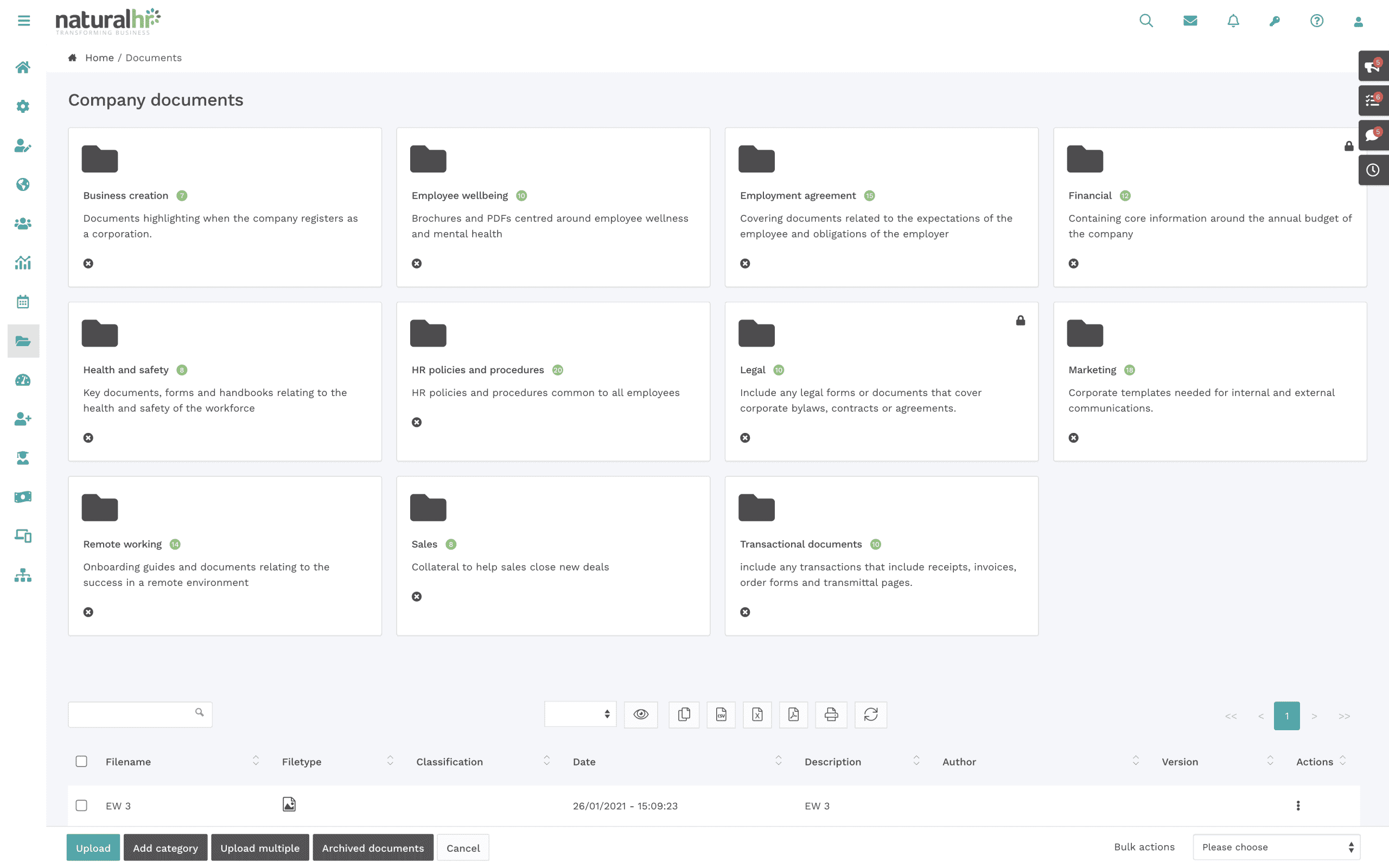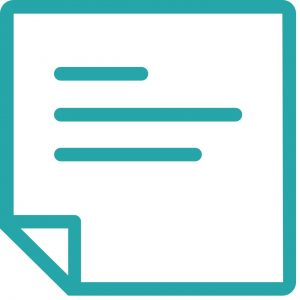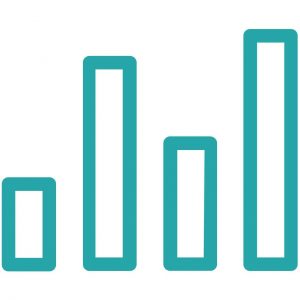Go paperless and store all your key company and employee documents in one secure environment.
Join thousands of customers using our secure document management tool today




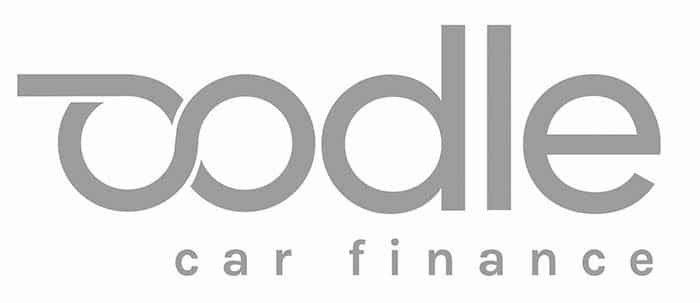


Efficient document storage
Easy access to all HR-related documents
Store all of your HR and employee documents in one single, secure location that is readily accessible.
- Employees have easy access to their documents anywhere, at any time
- Track and report on document views
- Categorise documents into folders, restrict access where necessary and set reminders that notify you of a document’s expiration date
Effective version control
Ensure everyone always has the most up-to-date documents
Provide your employees with access to the latest versions of company policies, contracts and key documents while maintaining complete control of the version available to them.
- Control which documents each employee has access to
- Allow employees to sign documents electronically
- Circulate new or updated documents to all employees quickly and safely
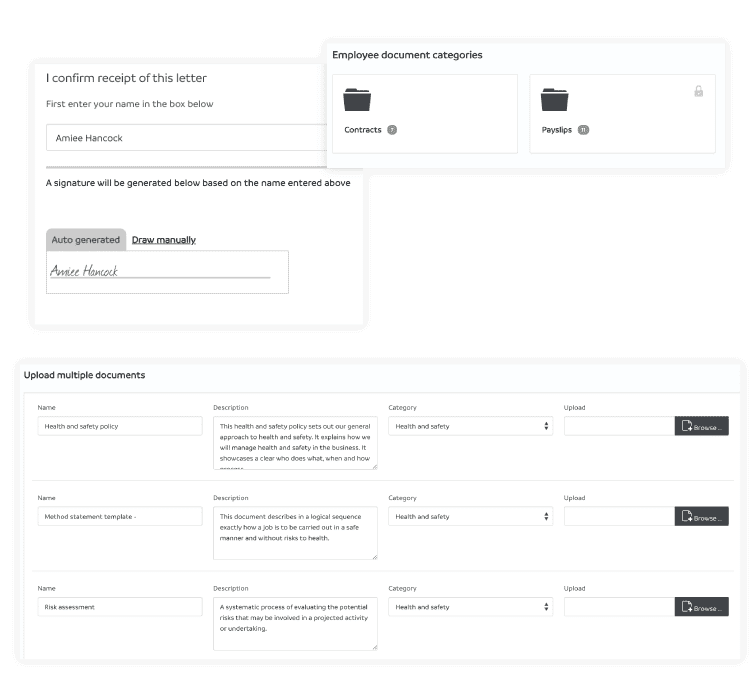
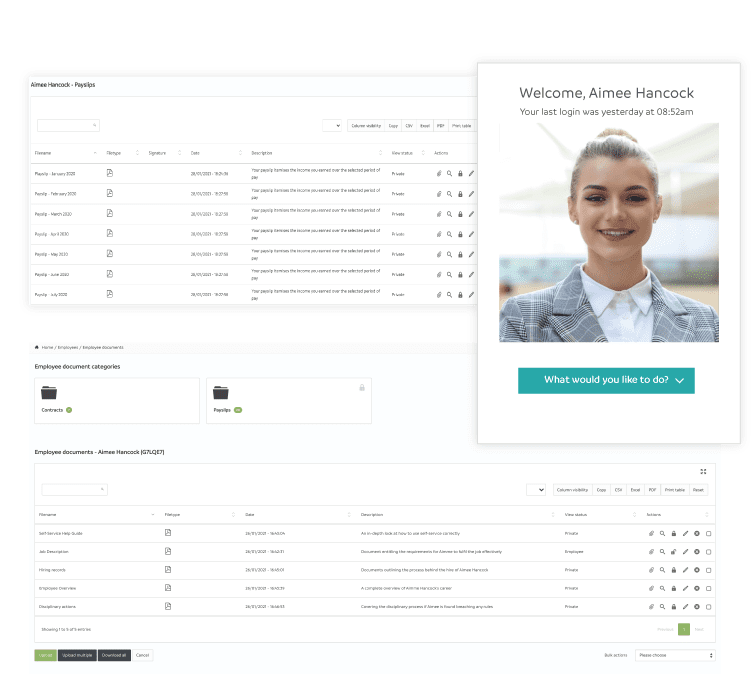
Document security and legal compliance
Minimise the risk of HR non-compliance
Store your documents in a secure, GDPR-compliant database that means all documents are kept safe around the clock.
- Robust privacy controls mean you know who has access to what and monitor who uploaded or viewed documents
- Securely archive or delete documents that are out of date or no longer needed
- Limit access by employee, department, job role and site
Save valuable HR time
01. Focus on more important tasks
Manage documents efficiently and compliantly, so that more time can be spent on value-adding HR activities.
Centralise HR documents
02. Streamline your HR admin
Upload, organise and share key documents like policies and handbooks with employees, while confidential documents – like contracts of employment, conduct records, and other sensitive information – stay secure.
Go paperless
03. Increase HR efficiency
Store your documents instantly in an electronic, secure, yet easily searchable format that makes paper copies and filing cabinets a thing of the past.
Document Management FAQs
What is HR document management?
HR document management involves managing the entire lifecycle of employee and business documents. This includes ensuring proper storage of required records, controlled access to documents and information, and timely disposal of obsolete files in a manner that is compliant with regulations like GDPR.
What is GDPR?
GDPR stands for General Data Protection Legislation. In summary, it is a European Union (EU) law that came into effect in 2018. GDPR governs the way in which we can use, process, and store personal data (information about an identifiable, living person). Despite it being an EU law, the UK has kept it after Brexit.
What is the fine if a company breaches GDPR rules?
The UK GDPR and DPA 2018 has set a maximum fine of £17.5 million or 4% of annual global turnover – whichever is greater – for infringements and breaches of the GDPR regulation.
Can an ex-employee can request their personnel file?
Yes. Your employee has the right to view their file. But businesses have that right to ask why they want to see their files. However, they must then provide all your records to you. Under the UK General Data Protection Regulation (retained from EU Regulation 2016/679 EU) (UK GDPR), individuals are entitled to submit a request for access to any personal data that the employer holds about them, i.e. any information from which they can be identified, directly or indirectly.
How long should you retain employee records for?
The main UK legislation regulating statutory retention periods is summarised below. If in doubt, it’s a good idea to keep records for at least 6 years (5 in Scotland), to cover the time limit for bringing any civil legal action.
Some key dates include:
- Accident books, accident records/reports: 3 years from the date of the last entry (or, if the accident involves a child/ young adult, then until that person reaches the age of 21).
- Accounting records: 3 years for private companies, 6 years for public limited companies.
- Coronavirus Job Retention Scheme:: 6 years for furlough records.
- First aid training: 6 years after employment.
- Fire warden training: 6 years after employment.
- Income tax and NI returns, income tax records and correspondence with HMRC: Not less than 3 years after the end of the financial year to which they relate.
- National minimum wage records: 3 years after the end of the pay reference period following the one that the records cover.
- Payroll wage/salary records (also overtime, bonuses, expenses):6 years from the end of the tax year to which they relate.
- Subject access request: 1 year following completion of the request.
- VAT deferral (COVID-19): 6 years.
- Whistleblowing documents: 6 months following the outcome (if a substantiated investigation). If unsubstantiated, personal data should be removed immediately.
What is an employee handbook?
The handbook should contain information on all workplace regulations. As a general rule, the contents would cover topics such as:
- Disciplinary procedures
- Sickness absence policies
- Grievance and harassment
- Equal opportunities
- Capability procedures


